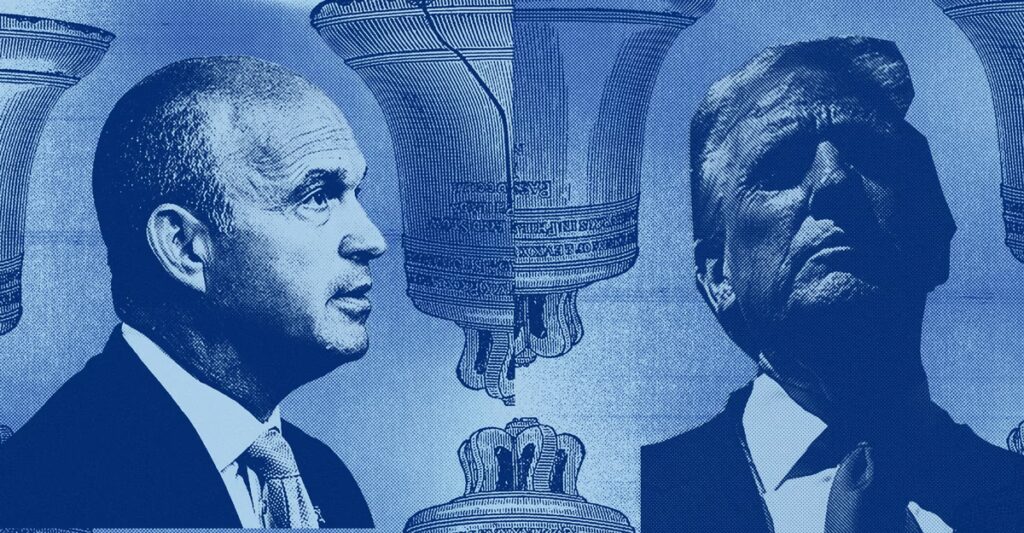The Heritage Foundation, which has stood for decades as the intellectual crown jewel of the conservative movement, has been convulsed in an ugly public spat over the organization’s approach to anti-Semitism. Employees and visiting scholars are resigning from and revolting against the think tank over its defense of the former Fox News host Tucker Carlson’s interview with Nick Fuentes, a white supremacist and anti-Semite who has gained prominence in MAGA circles. The conflict has exposed the degree to which previously forbidden bigotries have penetrated the heart of the Trump-era Republican Party. It has also revealed a somewhat different, yet related pathology: the brain death of the conservative movement.
Founded in 1973, the Heritage Foundation used to deliver the talking points for American conservatives, with white papers that reliably promoted free markets, free trade, a hawkish foreign policy, and limited government. The foundation still employs scholars and publishes papers, but lately it has aligned itself with the MAGA movement. It now operates as a kind of Trumpian messaging organ, bending its positions to comport with whatever the president says.
This has involved not only abandoning the think tank’s earlier principles on foreign policy and trade, but also embracing fringe characters who are beloved by Donald Trump’s followers. Heritage president Kevin Roberts did little to allay concerns about the foundation’s intellectual health with his explanation for why he defended Carlson’s interview. “I didn’t know much about this Fuentes guy,” Roberts insisted at an internal staff meeting. “I actually don’t have time to consume a lot of news.” A president of a Washington think tank confessing a lack of interest in politics recalls an old Saturday Night Live sketch in which Martin Short is an aspiring Olympic synchronized swimmer who needs a life preserver because he’s “not that strong a swimmer.”
[Jonathan Chait: The intellectual vacuity of the national conservatives]
This controversy has shoved Heritage into the spotlight, but the foundation is hardly unique in its MAGA-fied descent. Its travails reflect the debased state of conservative institutions, the Republican Party’s degeneration into a corrupt personality cult, and the collapse of intellectual standards. This collapse is a profound problem—one that Trump both exploited in his rise to power and exacerbated with his control over the Grand Old Party. The debacle at Heritage illustrates the impossibility of abiding by the long-standing intellectual values of open debate and truth-seeking while retaining any influence in a party led by Donald Trump.
When Trump arrived on the political scene a decade ago, nearly every prominent right-wing thinker rejected him as a crook and an almost comically transparent serial liar. But Trump’s surprising embrace by Republican voters, which persisted through January 6 and every other conceivable break point, has forced a horrible dilemma on the party’s intellectual elite: Back Trump and maintain some relevance within the party (as Heritage has done), reject him and go into exile, or adopt a selective silence, offering limited critiques while focusing mostly on the failings of Trump’s adversaries.
Some conservatives have maintained the same opposition toward Trump that they held before the 2016 election. Their primary mode of survival has been either to form new, Trump-skeptical publications (The Dispatch, The Bulwark) or to take jobs as the sensible, conservative voice on a liberal editorial page (David French, Bret Stephens). Others, motivated by fear, pragmatism, or a genuine change of heart, have realigned their values with Trump’s. Mollie Hemingway, a conservative commentator who dismissed Trump in 2016 as “a demagogue with no real solutions for anything at all” has refashioned the previously Trump-skeptical Federalist into a slavish organ that frequently lambastes conservatives for insufficient devotion to the great leader.
Among what remains of the conservative intelligentsia, the most common response to Trump and his MAGA movement has been occasional expressions of support punctuated by silence. The first Trump term instilled a habit of deflection and omission in the conservative media world. The second has made it a survival strategy. Almost every day brings fresh evidence of the Trump administration smashing norms or black-letter laws. I regularly search for the best conservative defense of these actions. Most of the time, I find nothing.
Do you remember, back in January, when Trump announced that he simply must possess Greenland and the Panama Canal? A series of conservative thinkers dutifully explained the strategic imperatives undergirding this demand. Trump was aware of the need to control Greenland’s mineral assets, they insisted, and to keep China from seizing control of the Panama Canal.
Trump appears to have completely abandoned both goals. It would be edifying to know how the conservatives who had deemed possession of these previously ignored territories to be a vital U.S. interest now judge Trump’s dereliction of these missions. But those defenders give no indication that they have undergone any reconsideration of Trump’s clumsy imperialist gestures. That silence leaves the impression that the president was correct to grow suddenly obsessed with territorial expansion, and he is correct to have apparently forgotten all about it.
Trump’s protectionist and isolationist gestures have similarly inspired vigorous defenses from the right. The president believes deeply in defending the national interest of the United States, according to his defenders, which explains why he has backed away from NATO’s collective security promises, and has treated foreign trade as a zero-sum contest.
Those theories are not worthless. But Trump extended to Qatar the very promise of American defense that he has threatened to withdraw from Europe. Why? Perhaps because Qatar donated a luxury jet to the Pentagon. If there is another rationale for offering American security to a nation with no clear vital national-security interest for the U.S., I haven’t heard it.
Likewise, Trump made a mockery of his supposed hard-headed determination to put American interests above all others when he arranged a $40 billion bailout package for Argentina. “Argentina is fighting for its life,” Trump told reporters. “They have no money, they have no anything. They’re fighting so hard to survive.” For a president whose crackdown on immigrants has been impressive for its breadth and mercilessness, this sudden compassion for the suffering of foreigners is intriguing. Trump also floated a plan to buy more Argentinian beef, which angered American cattle ranchers and undercut the logic of every other trade maneuver he’s made. What do the right-wing exponents of Trump’s “America First” doctrines make of these moves? For the most part, I couldn’t tell you.
There’s also Trump’s spate of vindictive prosecutions against New York Attorney General Letitia James, former FBI Director James Comey, and others. Some conservatives have defended these moves as retribution for the supposedly unfair and surely partisan treatment Trump received at the hands of the justice system. You might not think much of these arguments, and I don’t, but they are at least arguments.
Yet Trump himself has been meddling with the justice system to issue pardons or bestow other acts of mercy on various fraudsters and felons who also happen to be allies or donors. His explanation for commuting the sentence of the convicted fraudster George Santos included the line, “At least Santos had the Courage, Conviction, and Intelligence to ALWAYS VOTE REPUBLICAN!” Whatever complicated rationales his defenders can devise, Trump’s actual legal principle is apparently that he and his allies are permitted to commit crimes, and he is entitled to order up charges against anybody he dislikes.
Trump has been busily creating a legal regime in which his opponents are punished while his allies are rewarded. This is a profoundly consequential move—one that, at the very least, merits public debate. The crisis of conservative thought has made such a debate impossible.
A healthy movement would never have been taken over by the likes of Trump in the first place. The mental habits that have predominated under Trump germinated over decades of time.
Jacob Weisberg once called the partnership of right-wing media, intellectuals, and activists “the Conintern,” a play on Comintern, the name of the network that disseminated the Soviet party line through the various organs it controlled. The Soviet parallels have since become a grim internal joke; The Wall Street Journal reports that Heritage scholars call Roberts’s eighth-floor office, where wayward staff are summoned to better heed the consensus message, the “Politburo.”
[Read: The Nick Fuentes spiral]
One important Conintern center was a weekly meeting convened in the early 1990s by the anti-tax activist Grover Norquist, who brought together lobbyists, other activists, and conservative journalists who would then disseminate the chosen message in unison.
Fox News was founded in 1996 on the perfectly valid premise that mainstream media bears a liberal bias. Yet the creation of a conservative news ecosystem run by Roger Ailes, a partisan operative, made it possible for large swaths of the Republican electorate to ignore every other news source. By the Obama era, liberal critics began to notice a phenomenon that the writer Julian Sanchez called “epistemic closure,” which described the way many conservatives refused to accept the legitimacy of anything outside of conservative media.
This propagandistic and often paranoid partisan news environment proved to be a fertile breeding ground for demagogues. Trump, an avid consumer of Fox News and other right-wing media, recognized that the positions handed down by the Conintern did not always comport with the desires of the party’s base—particularly on trade, immigration, and entitlements such as Medicare and Social Security. More important, Trump grasped that the party’s rank and file had grown so detached from reality, so suspicious of mainstream purveyors of information at all, that large segments of it would believe anything he said, however preposterous, as long as it flattered their beliefs.
Trump’s rise precipitated a crisis for the conservative elite. Trump initially had virtually no support from the party’s intellectual class, which viewed him as morally unfit, ideologically unreliable, and likely to lose. His victory in 2016 mooted the last objection, but the others remained. Conservative media’s audience, however, had no appetite for criticism of Trump. The definition of truth had gone from whatever conservative elites decreed to whatever Trump said.
This isn’t to say there aren’t rational reasons for principled conservatives to support Trump. Despite his whimsical deviations from traditional Republican policy, the president has advanced core conservative goals such as cutting taxes, reducing social spending, and curbing business regulations. Some partisans are content to make peace with once-unfathomable levels of grift and graft in service of those goals.
Neither are selective silences particularly unusual. It is in the nature of partisanship to focus more heavily on issues that favor your side. Joe Biden’s most ardent supporters far preferred talking about his big infrastructure investments than, say, his chaotic withdrawal from Afghanistan. Yet the distinction between normal partisanship and this relentless strategic silence is not a difference of degree but a difference in kind. American society writ large remains free, despite Trump’s desire to stamp out dissent in the media. But the conservative subculture has become an internal North Korea.
Trump’s most outrageous innovation was dispensing with the pretense that he needed to provide reasons for his positions. The source for all of his claims was his own authority—he endlessly assured audiences that he knew more about anything than anybody (“Believe me”). Those who endorsed him—at first, mostly a motley collection of has-beens or outsiders—were winners. Anybody who challenged him was a loser whom Trump would dismiss, playground-style, as crazy, weak, sick, dumb, pathetic, a liar, a bimbo, a piggy. His greatest apostasy was not his rejection of any particular set of ideas, but his categorical rejection of the whole notion of ideas.
The Trump era, at its core, is the product of the replacement of thinking with propaganda. Trump demands a kind of mindless loyalty because he’s not only impulsive, inconsistent, and petty, but also a compulsive liar. In place of any pretense of using facts and logic to make public cases for his positions, he employs slander, abuse, and threats.
In theory, one could construct a coherent defense of Trump that acknowledged this, teasing apart the president’s substantive positions from his disordered public defense. In practice, this turns out to be impossible. There is no fixed definition of Trumpist policy that can be cleanly separated from the rhetoric used to sell it. The substance can change week to week, day to day, and the measure of its truth is always whatever Trump says at any given moment. You cannot defend a personalist regime without defending the person.
Consequently, defending Trump requires either flagrantly reversing yourself to maintain alignment with whatever position he adopts at any moment or simply ignoring them. The latter tactic is much easier and, hence, more popular.
Large swaths of Trump’s presidency are a kind of dark matter, treated as non-events by his own supporters. It is hard to find conservatives who are moved to either call out or defend his massive rollback of medical-research funding, his mass cancellation of previously approved wind and solar projects, his lavish praise of dictators who flatter him, his considerable self-dealing, or nearly any of the other outrages emerging from this administration.
Recently, Trump told Laura Ingraham that the United States needed to import talented workers. “We have plenty of talented people here,” interjected Ingraham, clinging to what, until that moment, had been the foundation of MAGA doctrine and the justification for tariffs, which were supposedly meant to support American manufacturing and protect American workers. “No you don’t,” replied Trump. “You can’t take people off an unemployment line and say, ‘I’m going to put you into a factory where we’re gonna make missiles.’”
Trump’s explanation for what appeared to be a bold contradiction of his earlier views was to assert that the ideological objective of his movement is simply whatever he says. “Don’t forget, MAGA was my idea,” he said. “MAGA was nobody else’s idea. I know what MAGA wants better than anybody else.”
Much of the right’s discourse has migrated to video or social media, where it’s easier to mirror Trump’s style. Social-media personalities such as Tucker Carlson and Phillip Buchanan—a right-wing influencer and conspiracy theorist with nearly 4 million followers on X, where he goes by “Catturd”—are meeting the demand for Trumpian commentary that essentially swings between trolling and cheerleading.
Whether measured in audience size or influence, the coin of the realm on the right is fealty to Trump. The recent row over anti-Semitism is instructive. Both factions—the anti-Semites and the anti-anti-Semites—have tried to paint the opposing side as disloyal to the president and his values. The anti-Semitic wing has cast its enemies as “neoconservatives” in line with the establishment Republicans who resisted Trump’s authoritarian demands in his first term.
[Read: The Trump steamroller is broken]
The anti-anti-Semites, in turn, have relentlessly highlighted the connections between the far-right anti-Semites and the anti-Zionists on the far left. Yet these attacks have pointedly excluded the man who dined with Nick Fuentes at Mar-a-Lago, who has repeated anti-Semitic tropes about bankers being “Shylocks,” and whose political movement inspired the recent rise of white nationalists in national politics. But to concede that a critique of right-wing anti-Semitism might also apply to Trump himself would be to automatically forfeit the argument.
Roberts has maintained the Heritage Foundation’s primacy within the MAGA movement by aligning its mission with the defense of nearly any Trump stance. Having spent decades articulating a hawkish position on Russia, Heritage employees were pushed to conform to Trump’s Russophilia, to delete past tweets supporting aid for Ukraine’s self-defense, and to consult Carlson’s error-riddled monologues for guidance, according to The Wall Street Journal.
But some conservative elites are clearly beginning to question whether the benefits of aligning with Trump outweigh the costs. Despite the president’s hyperbolic boasts of falling inflation, trillions of dollars in new investment, and an ever-expanding list of wars he’s resolved (a number that magically echoes his months in office: six wars in six months, seven in seven, eight in eight), even once-fervent allies are starting to smell the rot. The economy has generated deep public discontent, the movement is now crawling with radicalized young white-nationalist incels, and Trump has spent far more time enriching himself than making life more affordable for anyone else.
Identifying and correcting errors is an important role for a political movement’s intellectuals. Conservative critics forced George W. Bush to ultimately recognize the failure of his occupation strategy in Iraq and change course. The Democratic partisans who shouted down criticism of Biden in the run-up to the 2024 election were ultimately out-argued by those who demanded his ouster. It is impossible to fulfill this role when a lone man defines what counts as success or failure—often in self-contradictory ways and regardless of the evidence. If the Republicans hope to stay in power, it would be wise for them to recover the ability to think.
The post The Conservative Movement’s Intellectual Collapse appeared first on The Atlantic.




